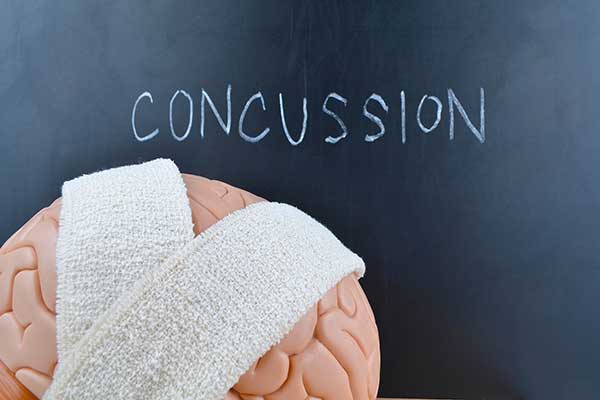<< Back
What is Post-Concussion Syndrome?

August 07, 2019
It can happen on the soccer field, in a car accident or at work – but after sitting in a dark room, quietly for a few days, the concussion you’ve suffered should heal, right?
Not always, according to Stephanie Alessi-LaRosa, associate director of the new Sports Neurology Program in the Hartford HealthCare Ayer Neuroscience Institute.
Weeks, months or even years later, you might be struggling with symptoms like repeated headaches, trouble sleeping, irritability and vision problems. Those, Dr. Alessi-LaRosa said, are linked with something called Post-Concussion Syndrome that needs to be treated in order to resolve.
“Post-concussion syndrome is a complex collection of multiple symptoms which continue after the initial injury to the brain has resolved for other reasons. Typically, any concussion symptoms occurring more than three weeks after the acute concussion would be considered Post-Concussion Syndrome,” she explained. “It is a separate condition than the initial concussion and should be treated uniquely and not as a ‘long concussion’ as it is often mistaken for.”
Anyone who has suffered a concussion can be impacted by Post-Concussion Syndrome but people with pre-existing neurologic and mood disorders are at most risk, she continued.
“People who already suffered from migraines or other headache types, depression, anxiety, Attention Deficit Hyperactivity Disorder (ADHD) or Attention Deficit Disorder (ADD) are particularly at higher risk for continued trouble,” Dr. Alessi-LaRosa said.
In addition, if you do not get appropriate treatment for a concussion, you might experience Post-Concussion Syndrome. That includes anyone who was advised to recuperate from a concussion by remaining quiet and still in a dark room for a period of time. That, she said, is no longer advised.
“Unfortunately, the early literature in concussion recovery encouraged ‘cocoon therapy’ where a patient is told to do nothing and stay in a dark room with no light, no sound, no physical activity, no reading and no interaction with others,” she said.
More recent research shows that this is not the best management for concussion patients and, she noted, ‘rest is not best.” The approach has become a major reason people develop Post-Concussion Syndrome.
Symptoms of Post-Concussion Syndrome, which vary from patient to patient, can include:
- Patient stops improving after a concussion, either reaching a plateau, worsening or experiencing fluctuating symptoms such as having good and bad days.
- Depression
- Headaches
- Dizziness
- Brain “fog”
“The person may experience the same symptoms as they did right after the concussion, or develop new symptoms,” Dr. Alessi-LaRosa said.
The condition can last weeks to months and even years after the person’s initial concussion, she added.
“In my experience, with appropriate treatment, the cases that have lasted several months can be resolved within weeks and the cases that have lasted years can resolve within months,” she said, noting that treatment requires “a comprehensive and unique evaluation that identifies all of the components of the patient’s syndrome and addresses all of them in a comprehensive way.”
It is important to approach each case with a wide lens because symptoms are often connected.
“To illustrate, a patient with Post-Concussion Syndrome is suffering from migraines, lack of sleep, neck pain, lack of physical activity, depression and concentration issues. If I only treat their migraines, the other issues will continue to cause migraines no matter what I do. I need to treat every issue in order to resolve their syndrome,” Dr. Alessi-LaRosa said.
To do that, each patient’s treatment will be unique to their lifestyle and goals. Board-certified in neurology as a trained sports neurologist allows her to understand the brain and its networks so she can identify and treat all aspects of Post-Concussion Syndrome.
“It’s very important to treat this because it significantly affects people’s quality of life and their ability to feel like themselves and be productive,” Dr. Alessi-LaRosa said. “It can be serious in some circumstances, for example, if there is severe depression or anxiety present. It has the potential to lead to suicidal thoughts and possibly attempted suicide.
“The mental health aspect of Post-Concussion Syndrome is multi-factorial and is treatable.”
For more information on treatment for Post-Concussion Syndrome, go to https://hartfordhealthcare.org/services/neurosciences/departments-services/sports-neurology.